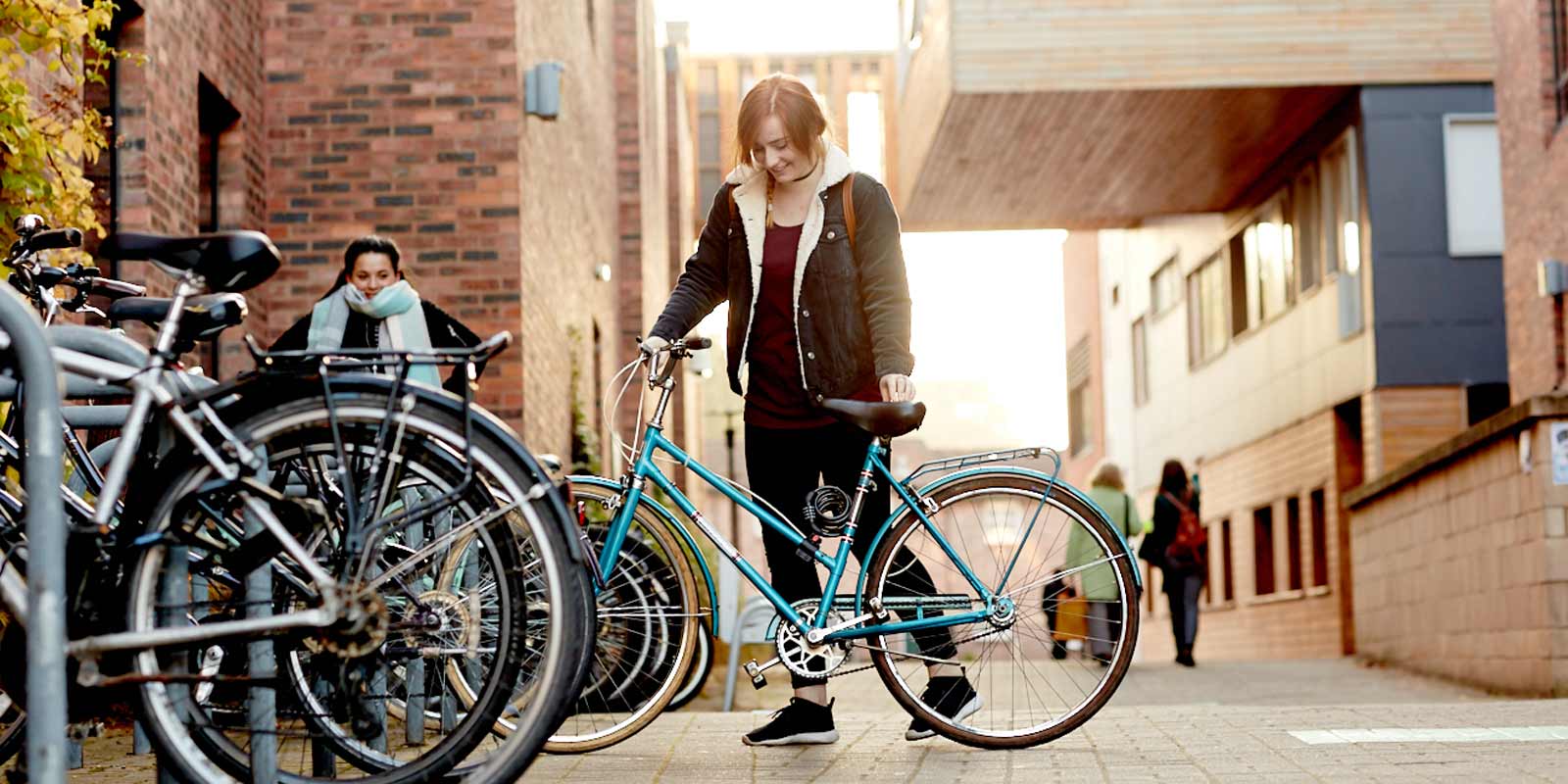Sustainability at York St John
Sustainable travel
Our commitment to boosting sustainable forms of travel.
/prod01/yorksjacuk/media/content-assets/safe-images/1600-x-1000/Staff-with-bikes.jpg)
With more than 10,000 students and over 1,000 staff at York St John University our environmental impact from travel is significant.
Everything from our daily commute to travelling internationally for research and field trips affects this. We're committed to working collectively to travelling in a more sustainable way.
Our 2024 travel survey found that staff and student commuting results in over 4,000 tonnes of CO2 emissions annually. Headline results from the survey can be found in our reports. Download the summary or full results below:
Air pollution from emissions, including carbon dioxide, particulate matter, and nitrogen dioxide, poses a significant threat to human health. The United Nations identifies air pollution as the greatest environmental health risk today (source: SDG website). Addressing this climate and health emergency requires collective action at local, regional, and global levels.

Our goals
The University is committed to reducing the negative impacts of car and air travel and to boosting the use of public transport and active travel. This can bring multiple benefits, such as improved wellbeing, lower costs and better air quality.
Our ambition is to cut carbon emissions from commuting by 10% by 2030 (using 2024 to 2025 as a baseline) and business travel related carbon emissions by 20% by 2030 (using 2018 to 2019 as a baseline).
What we've achieved so far
Sustainable travel initiatives:
- Free Bike Doctor bicycle maintenance sessions are held on our York campus
- A bike repair station has been installed at our main York campus between Fountains Learning Centre and Foss
- Cycle racks, lockers and showers are available at all of our teaching campuses
- Staff can access the Cycle to Work Scheme for discounted bicycles and accessories
- The number of parking spaces on our sites has been significantly reduced
- Parking permits are discounted for car sharers and low emissions vehicles
- Flights within mainland UK are not permitted for business travel
University initiatives that address the poor air quality resulting from travel:
- The installation of a green wall on our main campus in York, including plants which remove pollutants from the air near to a busy road
- Our Living Lab which explored air quality issues through teaching and extra-curricular activities, winning a Green Gown Award for 'Tomorrow’s Employees'
- The York Air Map created in a collaborative project involving University lecturer Clare Nattress, providing an accessible resource of local air pollution data for cyclists and the wider community
How to get involved
Choose active forms of travel such as walking, wheeling or cycling wherever possible. These resources can help you get started:
- Websites such as Sustrans and iTravel York
- Cycle racks, showers and locker facilities which are available at all of our teaching campuses
- Free Bike Doctor sessions are held at our main York campus
- There is a bike repair station has been installed at our main York campus between Foss and Fountains
- Staff can access the Cycle to Work Scheme discounts for bicycles and accessories
- Collect points and earn rewards for your travel with Better Points York
Our urban locations are well connected with public transport networks. For help planning your journey visit:
- York St John University website: Advice for local and commuting students
- London: TFL Journey Planner
- York: iTravelYork website
Car travel is a key source of air pollution and carbon emissions. If you need to travel by car, consider car sharing to reduce your impact. If buying a car, look for a low emissions vehicle.
For those seeking a car parking permit for York St John sites, car sharing and low emissions vehicles will receive a discount. Parking on our sites is extremely limited. There is no onsite parking available on our London campus.
For further information on car parking visit our Car parking information page or our staff intranet.
Avoid flying wherever possible. Instead opt for online meetings and conferences or look for alternative options such as train travel. A single flight can contribute significantly to the University's carbon emissions. Flights within the mainland of the UK are not permitted due to their disproportionately high level of environmental impact. Staff can access the Travel and Expenses Policy on the University intranet for further details.
Consider getting involved with campaigns such as Clean Air Day which takes place each year in June. This campaign:
- Focuses attention on air pollution
- Helps to improve public understanding and increase levels of air pollution busting behaviours
- Showcases that a cleaner air future is both possible and desirable
- Demonstrates large scale support for clean air, giving decision makers a mandate to implement the system changes required
Do you teach? Find ways to integrate air quality issues in the curriculum, no matter what discipline you teach.
For inspiration, visit our Living Lab page.
Learning at the Junction: air quality on the boundary of the University
